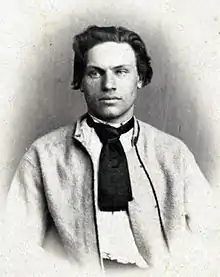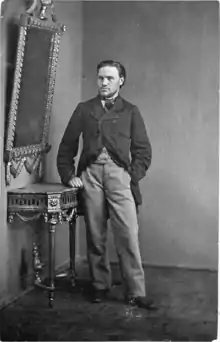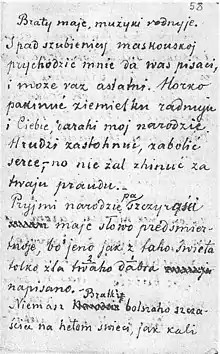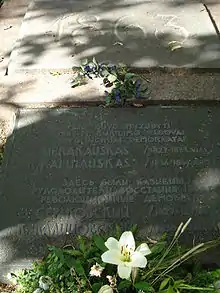Konstanty Kalinowski
Wincenty Konstanty Kalinowski, also known as Vincent Kanstancin Kalinoŭski (Belarusian: Вінцэ́нт Канстанці́н Каліно́ўскі) or Kastuś Kalinoŭski (Belarusian: Касту́сь Каліно́ўскі[1]), Konstanty Kalinowski (Polish) and Konstantinas Kalinauskas (Lithuanian) (2 February [O.S. 21 January] 1838 – 22 March [O.S. 10 March] 1864), was a 19th-century Belarusian[2][3][4][5] writer, journalist, lawyer and revolutionary. He was one of the leaders of the Polish, Lithuanian and Belarusian national revival and the leader of the January Uprising in lands of the former Grand Duchy of Lithuania in the Polish–Lithuanian Commonwealth.
Kastuś Kalinoŭski | |
|---|---|
 | |
| Born | 2 February 1838 |
| Died | 22 March 1864 (aged 26) |
| Nationality | Polish, Lithuanian, Belarusian |
| Parent(s) |
|
Life


Kastuś Kalinoŭski was born to an impoverished szlachta family. His father, Szymon, was a manager of the Mastaŭliany farm and manor (present-day Belarus).
The Kalinowski family hailed from the region of Mazovia (Polish: Mazowsze) and bore the Kalinowa coat of arms. After graduating from a local school in Świsłocz (now Svislach in Belarus) in 1855, Kalinowski studied at a private law school in Moscow. Soon he moved to St. Petersburg, where he continued his studies at the University of St. Petersburg and got involved in several Polish students' conspiracies and secret cultural societies. After graduating in 1860, he returned to the area of Hrodna, where he continued to work as a revolutionary.
He started publishing Mużyckaja prauda (Commoner's truth), one of the first periodicals in Belarusian (written in Łacinka) and two other Polish language clandestine newspapers. In his literary work, Kalinoŭski underlined the need to liberate all people of the former Polish–Lithuanian Commonwealth from Russia's occupation and to conserve and promote the Greek-Catholic faith and Belarusian language. He also promoted the idea of activisation of peasants for the cause of national liberation, the idea that was until then dominated by the gentry. He favored the good traditions of democracy, tolerance and freedom of the Polish–Lithuanian Commonwealth, as opposed to national oppression of cultures dominated by Imperial Russia.
After the outbreak of the January Uprising, he was involved in the secret Provincial Lithuanian Committee in Vilnius (Prowincjonalny Litewski Komitet w Wilnie). Soon he was promoted to the commissar of the Polish government for the Grodno Voivodeship. His writings made him popular both among the peasants and the gentry, which enabled the partisan units under his command to grow rapidly. Because of his successes he was promoted to the rank of Plenipotentiary Commissar of the Government for Lithuania (Komisarz Pełnomocny Rządu na Litwę), which made him the commander-in-chief of all partisan units fighting in the areas of today's' Eastern Poland, Lithuania, Belarus and Ukraine.

Last months, execution and interment
However, after initial successes against the Russian armies, the Russians moved a 120,000 men strong army to the area and the revolutionaries started to lose most of the skirmishes. Finally Kalinowski was betrayed by one of his soldiers and handed over to the Russians.
He was imprisoned in Vilnius, where he wrote one of his most notable works - the ''Letter from Beneath the Gallows'' (Pismo z-pad szybienicy), a passionate credo for his compatriots. He was tried by a court martial for leading the revolt against Russia and sentenced to death. On 22 March 1864, at the age 26, he was publicly executed on Lukiškės Square in Vilnius.
Kalinowski's remains, along with others, were clandestinely buried by the Tsarist authorities on the site of a military fortress on top of the Gediminas Hill in Vilnius. In 2019, Kalinowski's remains were excavated and identified, and solemnly reinterred in the Rasos Cemetery on 22 November 2019.
See also
Related reading
- Jan Zaprudnik & Thomas E. Bird: Peasant's Truth, the Tocsin of the 1863 Uprising in: Zapisy Belarusian Institute of Arts and Sciences. Vol. 14. New York, 1976.
- Kastuś Kalinoŭski, commentaries by Jan Zaprudnik and Thomas E. Bird: The 1863 Uprising in Byelorussia: "Peasants' Truth" and "Letters from Beneath the Gallows". Byelorussian Institute of Arts and Sciences, The Krecheuski Foundation, New York, 1980.
References
- The name Kastuś began to be used in the 20th century.
- Per Anders Rudling. The Rise and Fall of Belarusian Nationalism, 1906–1931. Pitt Russian East European Series. Pittsburgh: University of Pittsburgh Press, 2015. Illustrations. p. 37., ISBN 978-0-8229-6308-0
- Magdalena Waligorska. Review of Rudling, Per Anders, The Rise and Fall of Belarusian Nationalism, 1906–1931. H-Nationalism, H-Net Reviews. August, 2016.
- Vasil' Herasimchyk. Kanstantyn Kalinouski: Person and Legend. Hrodna: YurSaPrynt, 2018. 229 pp. [Герасімчык, В.У. Канстанцін Каліноўскі: асоба і легенда / В. У. Герасімчык. – Гродна: ТАА «ЮрСаПрынт», 2018. – 229 с.] (in Belarusian)
- Anatol' Mias'nikou. In Spite of Everything He is a Hero. Bielaruskaya Dumka. [Анатоль Мясьнікоў. І ўсё ж ён герой. Беларуская думка] (in Belarusian)
External links
| Wikimedia Commons has media related to Konstanty Kalinowski. |
![]() Belarusian Wikiquote has quotations related to: Kastuś Kalinoŭski
Belarusian Wikiquote has quotations related to: Kastuś Kalinoŭski
- Detailed biography of Konstanty Kalinowski, belarusguide.com
- Konstanty Kalinowksi biography, belarus-misc.org